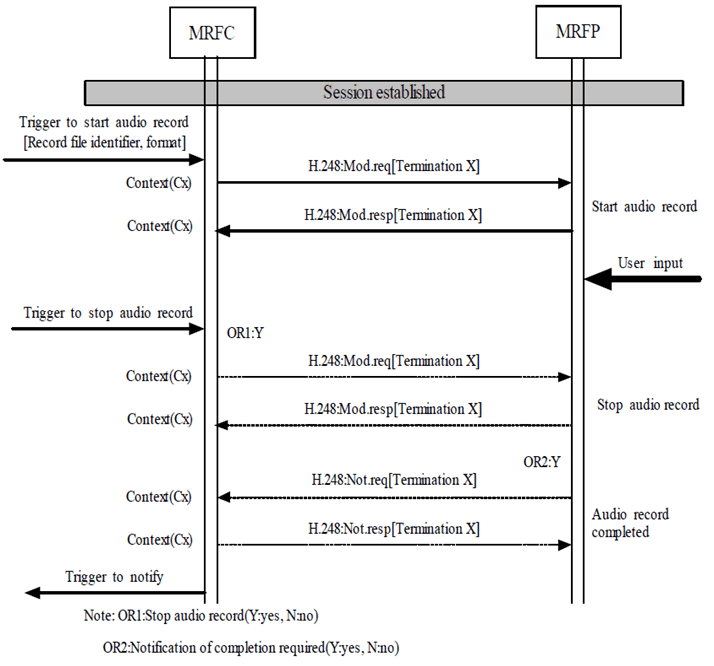Content for TS 23.333 Word version: 17.1.0
1…
4
5…
5.8…
5.12…
5.14…
5.20…
5.24…
6…
6.1.8…
6.2…
6.2.3…
6.2.4…
6.2.5
6.2.6…
6.2.7…
6.2.8…
6.2.9…
6.2.10…
6.2.10.2.7
6.2.10.3…
6.2.11…
6.2.13…
6.2.13.2.6…
6.2.14…
6.2.15…
6.2.16…
6.2.18…
6.2.19…
6.2.19.3…
6.2.20…
6.2.21…
6.2.22…
6.2.23
6.2.24…
7
8…
8.11…
8.20
8.21
8.22
8.23…
8.30…
8.39…
8.45…
8.56…
6.2.4 Audio Record Procedure
6.2.4.1 General
6.2.4.2 Start audio record
6.2.4.3 Stop audio record
6.2.4.4 Audio record completed
6.2.4.5 Message sequence chart
...
...
6.2.4 Audio Record Procedure p. 76
6.2.4.1 General p. 76
The following procedure assumes the IMS session has been established and the bearer is through-connected, and the MRFC has received a trigger to record audio, and the MRFP selected for the call has the capabilities to provide audio record.
6.2.4.2 Start audio record p. 76
After reception of a trigger to record audio, the MRFC should initiate the Start audio record procedure. The MRFC shall request the MRFP to record audio from one or all terminations in a context with the record file URI and record file format. If it is to record one party, only the input stream of the party is recorded. If it is to record all parties, the mixed stream of all parties is recorded.
When recording audio from all terminations in a context (for two-party sessions or a conference) the MRFC may request the MRFP to assign a new termination to record the audio in the context.
If other signals such as playing announcement are requested to be executed on the same termination as the termination to perform the recording the signals shall not override each other, e.g. the recording shall not be interrupted.
The record file URI can be generated by the AS/MRFC or by the MRFP. For the second case, the MRFC shall indicate the MRFP to generate the URI and return the generated URI to the MRFC. The record file format is the 3GPP multimedia file format, defined in the TS 26.244, and only the audio track is used for the audio recording. The MRFC may indicate the maximum record time to the MRFP. When the maximum record time has elapsed, the MRFP shall stop the audio recording.
The MRFC may request the MRFP to detect the audio recording completion, and notify the completion event and cause to the MRFC. The audio recording is completed when either of the following has occurred;
- the maximum time period of audio recording has elapsed,
- no input is detected,
- DTMF digits are detected by the MRFP where the DTMF key sequence shall stop or cancel the audio recording ,
- the MRFC requests the MRFP to stop the audio recording, or:
- the audio recording is not successful.
6.2.4.3 Stop audio record p. 76
After reception of a trigger to stop audio record, the MRFC shall request the MRFP to stop the audio recording. If the audio recording termination is added, the MRFC shall request the MRFP to subtract it.
6.2.4.4 Audio record completed p. 76
When an audio recording is completed, if the audio recording is successful, the MRFP shall save the record file to the specified URI. If the audio recording is not successful, the MRFP shall delete the record file. If the MRFC has requested the MRFP to notify the audio recording completion, the MRFP shall notify the audio recording completion event and the cause to the MRFC. The cause of the audio recording completed may be no voice has been input during a specific period, the maximum record time has elapsed, a DTMF digit that represents to finish or cancel the audio recording is detected by the MRFP, or the audio recording is not successful. Then the MRFC may indicate to the AS that the audio record has been stopped.
6.2.4.5 Message sequence chart p. 76
Figure 6.2.4.1 shows the message sequence chart example for audio recording.
